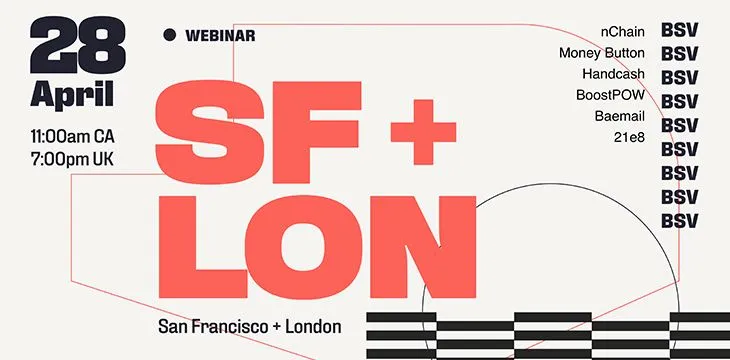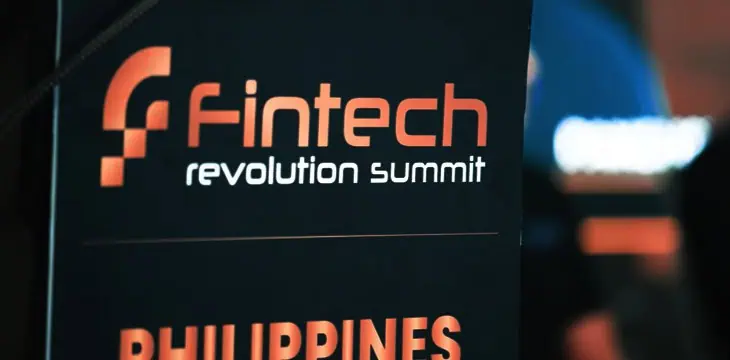|
Getting your Trinity Audio player ready...
|
Given that coronavirus is preventing the Bitcoin ecosystem from coming together physically, the first ever London + San Francisco BSV meetup took place online on April 28 as a webinar.
The webinar was a great place to learn more about the Bitcoin protocol, and the innovative ways that six companies—HandCash, Money Button, Baemail, nChain, Matterpool, and 21e8—are creating value in and around Bitcoin. If you were present at the meetup, then you already knew this. But if you were not able to make it to the webinar, here is a quick rundown of what took place.
What went down
The event was moderated and hosted by Darren Kellenschwiler (Deggen) from Baemail, beyond moderating, Deggen sorted through audience questions and administered them to the speakers near the end of their segments.
The London and SF BSV Meetups are coming together for an online event of the quarter, register here:https://t.co/4GUY5PdOYT pic.twitter.com/4XKhKTepyP
— Deggen (@deggen) April 25, 2020
The event kicked off with HandCash co-founder Rafa Jiménez and HandCash engineer Ivan Mlinarić. Both discussed the peer-to-peer protocol that was recently put into play between HandCash and Money Button. Money Button engineer Miguel Duarte spoke on behalf of Money Button, and together, the two teams talked about how P2P transactions work and how they have optimized the Bitcoin network.
Shortly after the HandCash and Money Button crews discussed peer-to-peer payment protocols, Ryan X. Charles, founder of Money Button, interviewed Dr. Craig Wright, the chief scientist at nChain. Charles asked Dr. Wright questions about the Bitcoin whitepaper and was able to get some clarification in regards to certain sections and phrases used throughout the whitepaper.
Next up was Money Button engineer Eva Ferreira. Ferreira’s discussion revolved around Invisible Money Button, a new feature from Money Button that allows Bitcoin applications to swipe a Money Button on behalf of their users; this allows app-creators to design the payment button to their liking, no longer restricting users to swiping a Money Button to pay.
Afterward, Daniel Krawisz, the chief scientist of Matterpool, took the (virtual) stage and told the audience all about Boost PoW—a product from Matterpool—that allows Bitcoin’s proof-of-work to be used for other purposes than transaction processing. In Boost PoW, Proof of Work is used as a system attached to messages and content that allows the audience to know when they are looking at reliable information—without relying on a central party.
Finally, Mark Wilcox, the founder of 21e8—the magic number company—presented on 21e8, a topic many people throughout all blockchain communities are curious about. 21e8 allows individuals to point their hash power toward content. In other words, 21e8 allows users to directly monetize information and attention.
Collaboration is key
A big takeaway that I got from the webinar is that with each of the features discussed, P2P, Invisible Money Button, Boost Pow, and 21e8, there is a way to collaborate with one another or implement these services in other platforms to optimize Bitcoin as a whole.
The companies in the Bitcoin community, especially those at the forefront, are here to work alongside you and help you. A little competition never hurts, but as Paul Martin said during CambrianSV Lisbon:
“Value is not measured in terms of price, it’s not measured in terms of what the equity of your company is worth, it’s measured in terms of how you change people’s daily lives, how you change the way they live their lives and make it more fruitful. I think we should all be conceiving of Bitcoin in that sort of way, and we can only do that if we all see ourselves as working for Bitcoin—Bitcoin the organism, Bitcoin the network.”
At the end of the day, we are all working to make Bitcoin a better place—and we can achieve that goal, and much more, if we work together. This doesn’t always mean coming up with new groundbreaking features ourselves, sometimes, it means reaching out to others and implementing features and protocols that they have already created to increase the efficiency of platforms and services built on Bitcoin when it is possible and appropriate.

 06-30-2025
06-30-2025 





